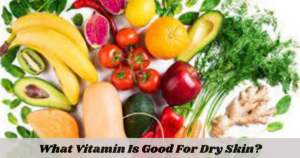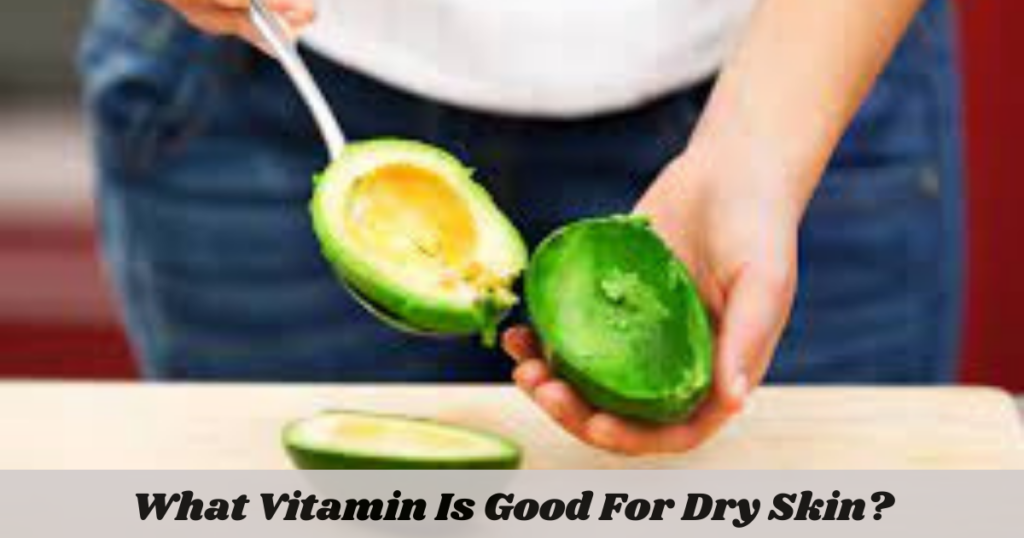What vitamin is good for dry skin? Dry skin can be a bothersome condition, causing discomfort and sometimes even leading to more severe skin issues if left untreated. One of the keys to combating dry skin is ensuring you’re getting the right vitamins and nutrients. In this comprehensive guide, we’ll explore vitamins that are particularly beneficial for dry skin, along with their natural sources, availability, advantages and recommended consumption levels.

What Vitamin is Good for Dry Skin?
1. Vitamin E
Vitamin E is often hailed as one of the best vitamins for dry skin due to its potent antioxidant properties, which help protect skin cells from damage caused by free radicals. This vitamin also aids in moisturizing the skin, promoting healing, and reducing inflammation.
Source:
- Natural sources of vitamin E include nuts (such as almonds and hazelnuts), seeds (like sunflower seeds), spinach, and avocado.
- Vitamin E supplements are widely available in various forms, including capsules and topical oils.
Advantages:
- Helps maintain skin hydration.
- Supports skin repair and regeneration.
- Reduces the appearance of fine lines and wrinkles.
Natural vs. Artificial:
- Vitamin E can be obtained naturally from food sources or taken in supplemental form. Both forms are effective, but natural sources provide additional nutrients and benefits beyond just the isolated vitamin.
Recommended Consumption:
- The recommended daily allowance of vitamin E for adults is 15 milligrams (22.4 IU). However, higher doses may be beneficial for individuals with specific skin conditions or concerns.
2. Vitamin C
Another essential vitamin for combating dry skin is vitamin C. This powerful antioxidant plays a crucial role in collagen synthesis, which is essential for maintaining skin elasticity and hydration. Additionally, vitamin C helps protect the skin from environmental damage and promotes a brighter, more even complexion.
Source:
- Citrus fruits (such as oranges, lemons, and grapefruits) are excellent natural sources of vitamin C.
- Other sources include bell peppers, strawberries, kiwi, and broccoli.
- Vitamin C supplements are readily available in various forms, including tablets, capsules, and powders.
Advantages:
- Promotes collagen production, leading to firmer, more hydrated skin.
- Helps fade hyperpigmentation and dark spots.
- Enhances skin’s natural defense against UV damage.
Natural vs. Artificial:
- While natural sources of vitamin C offer additional nutrients and fiber, supplements can provide a concentrated dose for those who may have difficulty meeting their needs through diet alone.
Recommended Consumption:
- The recommended daily intake of vitamin C for adults is 75 milligrams for women and 90 milligrams for men. However, higher doses may be necessary for individuals with specific skin concerns or conditions.
3. Vitamin A
Vitamin A, also known as retinol, is renowned for its skin-renewing properties, making it an excellent choice for dry skin. This vitamin helps promote cell turnover, unclog pores, and improve overall skin texture and tone. Additionally, vitamin A aids in maintaining proper moisture levels in the skin.
Source:
- Animal sources of vitamin A include liver, egg yolks, and dairy products.
- Plant-based sources include sweet potatoes, carrots, spinach, and kale.
- Vitamin A supplements are available in various forms, including capsules, tablets, and topical creams.
Advantages:
- Stimulates collagen production for smoother, more supple skin.
- Helps prevent and treat acne by regulating oil production.
- Supports overall skin health and vitality.
Natural vs. Artificial:
- While vitamin A can be obtained naturally from food sources, supplements may be necessary for individuals with inadequate dietary intake or specific skin concerns.
Recommended Consumption:
- The recommended daily intake of vitamin A for adults is 700 micrograms for women and 900 micrograms for men. It’s essential to avoid excessive intake of vitamin A, as high doses can be toxic.
4. Vitamin B3 (Niacinamide)
Vitamin B3, also known as niacinamide, is a versatile vitamin that offers numerous benefits for dry skin. It helps strengthen the skin’s natural barrier, retaining moisture and preventing water loss. Additionally, niacinamide has anti-inflammatory properties, making it effective for soothing dry, irritated skin.
Source:
- Natural sources of vitamin B3 include meat, fish, poultry, nuts, and legumes.
- Whole grains, mushrooms, and avocados also contain niacinamide.
- Niacinamide supplements are available in tablet or capsule form and are often included in skincare products.
Advantages:
- Enhances skin barrier function, reducing moisture loss.
- Improves skin texture and tone, minimizing the appearance of fine lines and wrinkles.
- Reduces redness and inflammation associated with dry skin conditions.
Natural vs. Artificial:
- While niacinamide can be obtained from dietary sources, supplements and topical formulations offer targeted benefits for individuals with specific skin concerns.
Recommended Consumption:
- The recommended daily intake of niacinamide for adults is 14 milligrams for women and 16 milligrams for men. Higher doses may be necessary for therapeutic purposes but should be monitored by a healthcare professional.

5. Vitamin B5 (Pantothenic Acid)
Vitamin B5, also known as pantothenic acid, is essential for maintaining healthy skin function, making it an excellent choice for combating dryness. This vitamin helps regulate oil production, keeping the skin hydrated without clogging pores. Additionally, vitamin B5 supports the skin’s natural healing process and reduces inflammation.
Source:
- Natural sources of vitamin B5 include meat, fish, poultry, eggs, and dairy products.
- Avocados, mushrooms, and sweet potatoes also contain pantothenic acid.
- Vitamin B5 supplements are available in tablet or capsule form, as well as in topical skincare products.
Advantages:
- Regulates oil production, preventing excessive dryness or oiliness.
- Accelerates wound healing and reduces redness and irritation.
- Improves skin softness and elasticity.
Natural vs. Artificial:
- While vitamin B5 can be obtained from dietary sources, supplements and topical formulations offer targeted benefits for individuals with specific skin concerns.
Recommended Consumption:
- The recommended daily intake of vitamin B5 for adults is 5 milligrams. Higher doses may be necessary for individuals with certain health conditions or skin issues.
6. Vitamin D
Vitamin D plays a crucial role in skin health, helping to maintain proper moisture levels and support overall skin function. While its benefits for dry skin may not be as well-known as other vitamins, vitamin D deficiency can contribute to various skin problems, including dryness and inflammation.
Source:
- The primary source of vitamin D is sunlight exposure, as the skin synthesizes vitamin D when exposed to UVB rays.
- Dietary sources of vitamin D include fatty fish (such as salmon and mackerel), egg yolks, fortified dairy products, and mushrooms exposed to UV light.
- Vitamin D supplements are available in various forms, including capsules and tablets.
Advantages:
- Supports skin barrier function and moisture retention.
- Helps regulate immune responses, reducing inflammation and irritation.
- Contributes to overall skin health and vitality.
Natural vs. Artificial:
- While sunlight is the most natural source of vitamin D, dietary supplements can help individuals meet their needs, especially in regions with limited sunlight exposure.
Recommended Consumption:
- The recommended daily intake of vitamin D for adults varies depending on factors such as age, sun exposure, geographic location, and individual health status. The Recommended Dietary Allowance (RDA) for vitamin D established by the Institute of Medicine is 600 international units (IU) per day for adults up to age 70 and 800 IU per day for adults over 70 years old. However, some experts suggest that higher doses may be necessary, particularly for individuals with limited sun exposure or certain medical conditions.
Conclusion
In conclusion, when asking “what vitamin is good for dry skin?” it’s essential to consider a holistic approach that includes a variety of vitamins and nutrients. Vitamin E, vitamin C, and vitamin A are among the top choices for promoting skin hydration, repair, and regeneration. Additionally, vitamin B3, vitamin B5, and vitamin D play crucial roles in maintaining healthy skin function and preventing dryness and inflammation.

